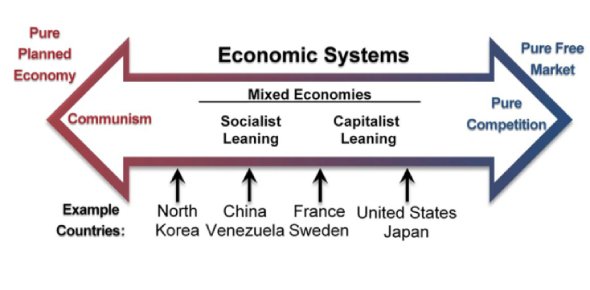
The Big Three
States generally choose from three economic systems:
- Market (Market Economy)
- Central planning (Planned Economy)
- Corporatism (Negotiation Economy)
The first two being the most prominent. Corporatism being a rarity in the modern era and rarely tried throughout history.
Usually, it’s not a pure form of either of the first two. It’s a mixture. Somewhere on a line with no government intervention at all at the right and complete-economy central planning at the left.
In general, these are the three options that modern states have at their disposal. They are the “Big Three”.
All three have benefits and all three have drawbacks. Some clearly more than others.
The market approach is the one most familiar to those of you that would be reading this. It’s the form with minimal government intervention, no central planning, price signals, innovation, no controls, et cetera. Generally a free market is when there is no government intervention and it is a competitive market when there is minimal planning for competition by the government. Pure free market is somewhat of a libertarian-fetish, whereas competitive markets are anti-monopolistic and regulatory but to a minimum amount necessary to promote fair competition.
Central planning is the opposite: they have central planners that direct the economy, full price controls, ownership of industry by government, and related functions.
Some people, especially on the Right, seem to worship the market as if it were a god. That it alone would just fix every problem we have if we just made it more free. I don’t take such an optimistic view. Central planning is the worst option of the three, but a pure free market (or competition-based market) isn’t a cure either. It leads to centralizers and an improper power cycle in the nation. It’s better than central planning, certainly, but it also lacks any types of safeguards to prevent against what will eventually destroy it.
An easy, acceptable breakdown image for the Planned v. Market economy is below:

The above is a basic visual showing the different placements given the two most prominent economic systems.
Corporatism is a different beast entirely. Most don’t even consider this an economic system, but it is clearly very distinct of planned or market so I believe it deserves its own spot.
Think of it like a combination of the pieces of a human body. They break down each piece, unite them, and then force them to negotiate for the whole. Corporatism is a political ideology which advocates the organization of society by corporate groups, such as agricultural, labour, military, business, scientific, or guild associations, on the basis of their common interests.
Corporatism is often tied to fascism or incorrectly regarded as “corporatocracy” (which it is not).
In a previous article, I wrote:
Corporatism is still practiced to this day in places like Hong Kong with their functional constituencies. It is not fascism-dependent, nor is it “control by corporations” as we think of modern corporations. It is based on guilds and interest groups. Historically, corporatism is tied with the political system of fascism because they used a corporatist economic system where the interest groups negotiated amongst themselves, while the state had the final say. But this state domination is not required in corporatism, as Hong Kong shows. In many ways, a modified variant of corporatism would be far superior to that of capitalism, as Hong Kong in its prime had demonstrated. It does not necessarily have to come side-by-side with tyranny or evil corporations.
From the wiki:
The term is derived from the Latin corpus, or “human body”. The hypothesis that society will reach a peak of harmonious functioning when each of its divisions efficiently performs its designated function, such as a body’s organs individually contributing its general health and functionality, lies at the center of corporatist theory.
And:
Corporatism does not refer to a political system dominated by large business interests, even though the later are commonly referred to as “corporations” in modern American legal and pop cultural parlance; instead, the correct term for this theoretical system would be corporatocracy.
Corporatism, in a nutshell, is the inclusion of these guilds that then have negotiating power with the others. The idea is that each guild would have equalized power, so no corporate interest would be higher than the others. And the interest of the whole people, per their inclusion and activism within their guild, would be effectively represented.
It’s not a bad idea in theory. In practice, it was problematic because of Fascism. Fascism gave the “final say” during the negotiation (or disputes) to the government. So, in effect, it was a guild-negotiation session, where the state had the final (and oftentimes first) say.
It does not have to function like this, however. The structure of corporatism in places like Hong Kong is far more interesting. They do not have a rule by one or dictatorship, so how corporatism works is entirely different. The guilds are given proportionality based on the “functional constituency” and then they vote given these lines. Disputes are then settled more-so by democratic voting instead of authoritarian state control. It’s not hard to imagine a full system based like this, instead of the smaller-system presented by Hong Kong, given their great example.
It’s not flawless by any means, but it’s an interesting incursion into an alternative to either central planning or the free market approach.
The bad part about corporatism is generally that we don’t know what it would do. We don’t have many examples to draw from that weren’t dictatorial, and so not super relevant in study to non-tyrannical systems. Additionally, it would not be fully efficient if negotiations had to be done on small-scale issues that are better suited to the market (for obvious reasons).
Personally, I am not an die-hard fan of either of these economic systems.
I like the idea of a mixed system using all three segmented appropriately. Because of the name of this website, let’s call the segments “dominions”.
We could have one dominion that is the “free market” dominion, which is where nearly all businesses lie. Then we could have a corporatist dominion, which is where major, large corporations would reside. The “public square” type of institutions that cause us so many problems today. Finally, we’d have a final centrally planned dominion, where problem businesses would reside.
It’d be relatively easy to segment businesses using these three categories. All small-medium businesses in the first. Most large businesses in the second. Problem large businesses in the third.
This way, we could account for the benefits of the free market, while giving us some leverage to deal with the absolute negatives of the free market (such as centralization and power disparity of large businesses and the isolated class). Small businesses would be free to innovate and operate without interference. Large corporations would be beholden to interest groups, voting, and negotiations instead of free rein to do whatever they want. Meanwhile problem entities, like Google, could be completely broken down and sold off as component parts to reduce their monopolistic influence and control using the final dominion.
IE: Consider it a mixed system using all three of the Big Three. Segmented in dominions based on their respective status in the nation. This would give us the massive innovation, efficiency, and freedom of the free market choice, with the corporatist negotiating/arbitration power to thwart centralizers in major corporations through voting. Finally, it’d also give us the ability to break-down and destroy problematic institutions, using the final dominion.
The republic is a mixed system of rule by one, rule by few, and rule by many frameworks. My idea is to do a similar setup but with a mixed system between the Big Three economic systems.
This is an under-discussed subject, but an important one. I don’t see a way for a free market to sustain itself long-term given historic trends. I don’t see a way to make central planning less terrible. Nor do I see corporatism as a cure in and of itself. So, I don’t really align with any of the options. Every option is significantly lacking, so no matter the approach we take going forward, I do believe we have to abandon the Big Three in the quest for something better.
Read Next:
The Problem Of Reductionism On The Right
When Everything Surrounding Us Is Nothing But Lies
Happily Residing In The Lower Economic Classes
If you enjoyed this article, bookmark the website and check back often for new content. New articles most weekdays.
You can also keep up with my writing by joining my monthly newsletter.
Help fight the censorship – Share this article!




